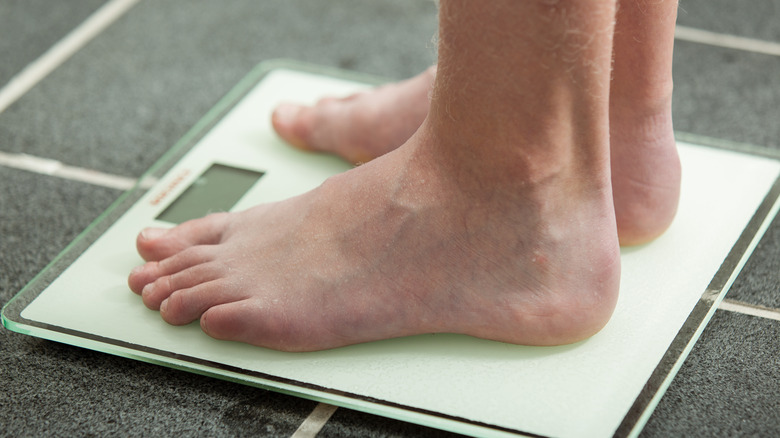In a world where people are so focused on their physical appearance, it’s normal for someone to feel insecure about their weight from time to time. For some individuals, however, their body weight insecurities can take over their lives, and could turn into an eating disorder. One of the most widely discussed eating disorders, anorexia nervosa, can become so severe that it could result in death, according to the American Addiction Centers.
Anorexia is classified as a mental health disorder in the fifth edition of the Diagnostic and Statistical Manual of Mental Disorders (DSM-5). For those with anorexia, they may experience symptoms of significant weight loss and appear unusually thin (per Mayo Clinic). As a result of malnutrition and losing a significant amount of weight, they can become fatigued and dizzy, have decreased blood pressure, become dehydrated, and lose their hair or have it become thin and brittle.
The behaviors of someone with anorexia are often driven by equating thinness with self-worth, according to the Mayo Clinic. The National Eating Disorders Association reports that someone who is struggling with anorexia will often be terrified of gaining weight, which triggers obsessive behaviors involving food and the body, such as not eating enough, only eating “safe” foods, and frequently checking the scale or mirror.
Generally speaking, people tend to associate eating disorders with women. It is important to recognize, however, that men can also experience overpowering insecurities about their weight, and anorexia in men may be more common than one might initially consider.
Men can have anorexia too

Although women might be associated with anorexia more often, that doesn’t mean that men can’t have the disorder. As explained by Choosing Therapy, almost 25% of anorexia cases are among men, yet some men go undiagnosed for several reasons. Many men are hesitant to seek professional help because of the misconception that eating disorders are “female” disorders. Furthermore, most of the research conducted on eating disorders hasn’t included male participants.
A significant number of men with anorexia have the desire to become lean and muscular, which can fuel their disorder, according to Psych Central. Men with anorexia may take steroids, supplements, and exercise excessively in addition to controlling their diet. A man might have anorexia if he exhibits particular signs such as taking frequent trips to the bathroom around meal times, avoiding food, weighing himself excessively, calorie counting, or being fixated on working out or bodybuilding.
Treatment for anorexia in men typically includes therapy, such as Cognitive Behavioral Therapy or Dialectical Behavioral Therapy. In severe cases, a man with anorexia might be treated in a residential treatment center. Taking medications to treat symptoms of anxiety and depression, changing one’s lifestyle by practicing self-care, or joining a support group may also be beneficial.
If you are struggling with an eating disorder, or know someone who is, help is available. Visit the National Eating Disorders Association website or contact NEDA’s Live Helpline at 1-800-931-2237. You can also receive 24/7 Crisis Support via text (send NEDA to 741-741).








